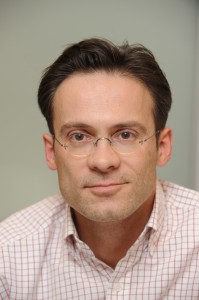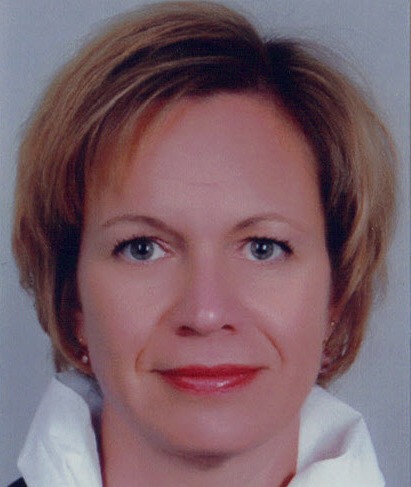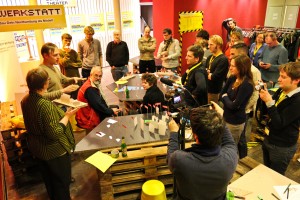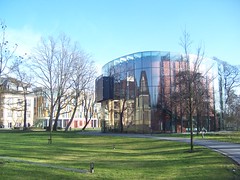 The past week has seen a feast of eParticipation in Hamburg: the Open Government Stammtisch at Kultwerk West last Wednesday evening, a pre-Summit warm up with Nick Booth at Kultwerk West on Sunday evening, the Summit itself, and the first Hamburg social media surgery on Monday evening. It’s been energising, inspiring, refreshing and exhausting all at once.
The past week has seen a feast of eParticipation in Hamburg: the Open Government Stammtisch at Kultwerk West last Wednesday evening, a pre-Summit warm up with Nick Booth at Kultwerk West on Sunday evening, the Summit itself, and the first Hamburg social media surgery on Monday evening. It’s been energising, inspiring, refreshing and exhausting all at once.
Hamburg has a growing network of eParticipation experts/enthusiasts, a community that has been given new life by Government 2.0 Netzwerk‘s efforts to revitalise it by organising regular information meetings (Stammtische), one of which was held here at TuTech. So the idea behind the Summit was to feed this community with new ideas from outside Germany, but also to show the outside world what Hamburg has to offer.
In terms of learning from new ideas, we heard from Nick Booth about social media surgeries and his theory of Zero Expectations; Peter Verhaeghe’s ideas about the role of an architect as a mediator between citizens and politics; Erik Tissingh’s presentation of 3D citizen participation tools. Then there were the informal presentations in the break with presenters from Germany, the UK, Austria, Italy and Denmark.
And on the second point: Hamburg’s campaign for a local transparency law is unlike anything elsewhere in Europe. As far as I can see, it is the only high-profile open data campaign of its type. And with Twitter comments like this — “Everyone doing participation should have @nexthamburg‘s principles above their desk” — no-one can deny that Hamburg has a lot to say about participation.
Judging by the feedback, we managed to do what we set out to. To organise such an event wouldn’t have been possible without PEP-NET: the contacts, the brand, the publicity tools such as the mailing list and the blog. We got in touch with Peter Verhaeghe thanks to a suggestion from Dieter van de Putte, of PEP-NET member De Wakkere Burger. So with a bit of creativity and quite a bit of work, we made the most of PEP-NET and everyone’s a winner. We had a blast!
For more information about what was discussed, have a look at the full report by Noella Edelmann from the Centre of E-Governance at the Danube University.
]]>Hamburg already publishes some data online and is planning to release more, according to the Senate’s (Hamburg’s Cabinet’s) answer to an enquiry from Hansjörg Schmidt, the SPD parliamentary group’s representative on media and online policy.
Schools performance data, information on cancer patients, air quality and water quality are all available online and in many cases downloadable in Excel format. I had a quick look through these websites and it does appear that information in Excel format is relatively easy to get at, although it is questionable whether this is really raw data since it is presented in a non-standard format and appears in some cases (for example the schools data) to have been pre-crunched. In the case of water data, making this data open is a technical challenge — at the moment, only a description of the data is available due to its size.
The city will also release geographic data at some point, including the location of play areas and police stations. There appears to be no promise that this will coincide with the launch of the portal and no cast-iron guarantees about exactly what data will be made available.
The Senate’s response does not make a clear commitment to launch a portal, but NDR reports that the City has officially announced its intention to do so by the end of the year.
Alongside talk of an open data portal, the campaign for a Transparency Law is making much greater demands. The backers of the law want to go much further and are pushing for a law that will oblige the local government to open all of its data unless there is a compelling reason not to do so. A comment on Hansjörg Schmidt’s blog suggest that some backers of the Transparency Law may see this as an attempt to diffuse their campaign by opening some data. I am sure this will be a hot topic at the next Open Government Stammtisch on 9th May and the PEP-NET Summit on 14th May.
]]>Arzun Kolcu is a Dipl.-Ing. [branche of architecture] with a particular interest in public buildings, especially in the conception of arts and museums. Raised in Hamburg, she studied architecture at the École d’Architecture de Nantes and the HafenCity University in Hamburg and gained practical experience in architecture, art, graphic and teaching of architecture. She now works primarily in set design. In her spare time she organises cultural events on art, architecture and other topics.
Arzun will be chairing a discussion on architecture and transparency at the PEP-NET Summit on 14th May 2012. For details, including registration, see amiando.com/pep-net.
]]>
Peter Verhaeghe
As an architect, civil servant, and engaged citizen, Peter Verhaeghe is familiar with citizen participation from several perspectives. He will be speaking at the PEP-NET Summit and taking part in a discussion about transparency, public participation, and architecture. He will argue that architecture is by definition co-productive and that an architect must build confidence by reconciling political pressure and pressure from citizens in a transparent manner.
Peter works as an architect for the Brussels Capital Region in Belgium. He is also a member of the citizens’ group stRaten-generaal. stRaten-generaal was awarded the Flemish Democracy Prize for its work in organising citizens against a proposed viaduct in preference of a tunnel.
Full details and registration for the PEP-NET Summit can be found at amiando.com/pep-net.
]]>
Alenka Krek-Poplin
Having studied Surveying in Ljubljana before specialising in Geographical Information Systems through work and academic study in Austria, the US and Germany, Prof. Alenka Krek-Poplin is co-founder of Hamburg’s Digital City research group, which focuses on the application of spatial data-modelling to city planning. She writes, researches and teaches on computer-aided participation in spatial planning at the HafenCity University Hamburg.
Alenka’s work focuses on how, by adding an element of fun and enjoyment (or joy) to spatial planning, it can be made more interactive and compelling and thus increase levels of participation. Her recent article “Playful public participation in urban planning: A case study for online serious games” explores aspects such as story-telling, sketching and drawing, and digital games that have the potential to make public participation (in my words) easier and less boring.
The example she draws upon in the article, Nextcampus, was a prototype of a game that she and some of her students designed and simulated. The prototype game dealt with the suggested relocation of the University of Hamburg, which has been a hot topic in recent years.
Added to this, she has conducted several projects that explore the use of public participation through geographical information systems. One of these projects was a survey of how people use the waterways around Wilhelmsburg, an island in Hamburg’s River Elbe. Participants were asked whether they carry out certain activities and were able to draw on the map, stating where they engage in them.
The most recent example, sowillichleben.com, is a website built by students to enable them to influence the building of their halls of residence in a game-like manner. One of the ways students were able to express their wishes was to stick virtual notes on areas that represented private room, communal area, and surrounding area. So they could, for example, stick a note with “privacy” on the part representing their room, and “meet new people” on the part representing the communal areas. She has also been involved in a project that enabled citizens to plan the layout of a town square using 3D objects.
In her paper describing Nextcampus, Alenka details some of the criticism that the model attracted from some experts who were asked to evaluate it. One of these was the difficulty in distinguishing between when participants are just playing, and when they are serious about what they are suggesting. I am looking forward to discussing this point at the PEP-NET Summit because it acknowledges a part of participation that I feel we pay much too little attention to. We tend to ignore that citizens always have participated in discussions with no expectation, or even desire, of their discussions leading to some kind of result, for example talking about politics at the pub, going to events to hear about political topics but not doing anything about them, and taking part in flashmobs; but this type of not-for-real participation is essential and, I suspect, one way or another leads to a much healthier public discourse and ultimately better public decisions.
Of course the other half of the equation is what to do with the results that people mean seriously, and we will be talking about that too!
For more information about the PEP-NET Summit and to register, visit https://amiando.com/pep-net. You can also find information at https://pep-net.eu/the-pep-net-summit-out-in-the-open/
]]> The growth of movements like the Right to the City Movement and protests like Stuttgart21, Gängeviertel, or NO BNQ show the continuously increasing demand for more public participation in urban development. The pilot project Nexthamburg experiments with new ways of public participation in the urban development of Hamburg. The concept of the open and independent crowd-sourcing project will be presented at the PEP-NET Summit on 14th May.
The growth of movements like the Right to the City Movement and protests like Stuttgart21, Gängeviertel, or NO BNQ show the continuously increasing demand for more public participation in urban development. The pilot project Nexthamburg experiments with new ways of public participation in the urban development of Hamburg. The concept of the open and independent crowd-sourcing project will be presented at the PEP-NET Summit on 14th May.
Nexthamburg gathers solutions and challenges for the city of Hamburg in crowd-
sourcing processes. Citizens can post their own solutions for the big challenges on the webpage or other Nexthamburg social media channels, discuss, comment or follow others, create their own vision for Hamburg. They can also participate in one of the Nexthamburg events, for example Nexthamburg Sessions, Salon, Zukunftscafés, or the Zukunftscamp.
The long-term goal of the project is to organize a crowd-funding channel for promising ideas for Hamburg’s urban development to finance feasibility studies and realization efforts.
Nexthamburg is active since April 2009 and has been promoted as a pilot project of national politics of urban development by the federal ministry for traffic, building, and urban development until 2011. It is supposed to become a non-profit association in 2012.
Nexthamburg on nexthamburg.de, facebook, twitter, google, flickr, youtube, issuu

Photo of Kultwerk West
The social media surgery format, which was introduced by Nick Booth and others in 2008, has already spread beyond Birmingham to other parts of the UK and indeed abroad. Nick and his social enterprise Podnosh even won an award from the UK Prime Minister for their work. Now social media surgeries are coming to Germany and I’m really pleased to announce that Hamburg will be hosting the first one!
On 14th May 2012, the evening of the PEP-NET Summit, Kultwerk West (a voluntary organisation that I’ve been getting involved with in my spare time and whose website I rebuilt) will be organising an informal meeting between politically engaged citizens and people who know a thing or two about social media.
I think Kultwerk West is the perfect place to start, because the events we organise twice per week attract plenty of people who are interested in current affairs and are in many cases active citizens, but who are not necessarily comfortable using social media. In many cases, they are sceptical of them due to fear-factors like Datenschutz, data protection.
To make the occasion even more special, Nick Booth, who is in town to speak at the PEP-NET Summit, will be Hamburg’s first social media surgeon.
You can find out more about the social media surgery model at socialmediasurgery.com. If you are coming to the PEP-NET Summit and are interested in helping out at the first social media surgery in the evening, please get in touch via summit@pep-net.eu or leave a comment on this thread.
UPDATE: The Kultwerk West Social Media Surgery is now registered on socialmediasurgery.com, Podnosh’s online tool for managing social media surgeries.
]]>The proposed transparency law was drafted using a wiki, which was open for anyone who wanted to to participate. It calls for a central information register, listing all of the city’s official publications; a duty to publish, which includes public data; and the extension of the right to information to voluntary organisations, especially campaigning organisations and not merely private individuals.
The campaign argues that such a law would reduce corruption, reduce wasting of taxpayers’ money, increase trust in politicians and the local authority, simplify administrative procedures and make participation easier.
Mehr Demokratie e.V. successfully collected the 10,000 valid signatures required for a local Citizens’ Initiative and the state parliament’s judicial affairs committee will decide whether to accept the law on 28th February. Mehr Demokratie is preparing for it to be rejected, in which case they will have to collect a total of 62,000 valid signatures within three weeks to force a local referendum.
]]>
Photo of Nick (by Pete Ashton)
I’m very pleased to announce that Nick Booth, founder of Birmingham social enterprise podnosh and recent winner of the Prime Minister’s Big Society award, will be speaking at the PEP-NET Summit 2012 in Hamburg on 14th May.
Nick is best known for his social media surgeries, regular meetings at which volunteers help active citizens get to grips with using social media for social good. Starting in central Birmingham, the surgeries have spread across Birmingham, the UK, and now the world. (We’re even going to be starting social media surgeries here in Hamburg!)
For more information about Nick and what he does, see my interview with him from a couple of years ago or his website, www.podnosh.com.
Register for the PEP-NET Summit 2012 at amiando.com/pep-net.
]]>
Photo by karikas on Flickr.com
The PEP-NET Summit 2012 will take place on 14th May 2012 at the Bucerius Law School in Hamburg. We are looking forward to an interactive event with plenty of space for networking and discussion. Anybody who is interested in eParticipation, at all levels of experience, is invitedto attend.
With an audience of European eparticipation enthusiasts, local engaged citizens, and representatives of the City of Hamburg, the PEP-NET Summit will again be a bustling marketplace of ideas and an opportunity for participants to catch up with each other and meet new people.
The first PEP-NET Summit took place on 23rd September 2010. We heard speeches from Cisco’s Paul Johnston, Andrea di Maio from Gartner, and Anke Domscheit-Berg amongst others. The summit was moderated by Richard Wilson and speakers from across Europe had the chance to present their projects and ideas in small, informal “presentation corners”.
Please block the date in your diary and register via amiando.com/pep-net. There is no entrance fee and places will be allocated on a first come, first served basis.
We look forward to welcoming you to Hamburg!
]]>